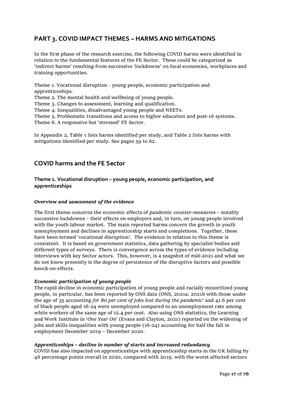
Page 17 of 76
PART 3. COVID IMPACT THEMES - HARMS AND MITIGATIONS
In the first phase of the research exercise, the following COVID harms were identified in
relation to the fundamental features of the FE Sector. These could be categorized as
'indirect harms' resulting from successive 'lockdowns' on local economies, workplaces and
training opportunities.
Theme 1. Vocational disruption - young people, economic participation and
apprenticeships.
Theme 2. The mental health and wellbeing of young people.
Theme 3. Changes to assessment, learning and qualification.
Theme 4. Inequalities, disadvantaged young people and NEETs.
Theme 5. Problematic transitions and access to higher education and post-16 systems.
Theme 6. A responsive but 'stressed' FE Sector.
In Appendix 2, Table 1 lists harms identified per study, and Table 2 lists harms with
mitigations identified per study. See pages 59 to 62.
COVID harms and the FE Sector
Theme 1. Vocational disruption - young people, economic participation, and
apprenticeships
Overview and assessment of the evidence
The first theme concerns the economic effects of pandemic counter-measures - notably
successive lockdowns - their effects on employers and, in turn, on young people involved
with the youth labour market. The main reported harms concern the growth in youth
unemployment and declines in apprenticeship starts and completions. Together, these
have been termed 'vocational disruption'. The evidence in relation to this theme is
consistent. It is based on government statistics, data gathering by specialist bodies and
different types of surveys. There is convergence across the types of evidence including
interviews with key Sector actors. This, however, is a snapshot of mid-2021 and what we
do not know presently is the degree of persistence of the disruptive factors and possible
knock-on effects.
Economic participation of young people
The rapid decline in economic participation of young people and racially minoritized young
people, in particular, has been reported by ONS data (ONS, 2021a; 2021b with those under
the age of 35 accounting for 80 per cent of jobs lost during the pandemic' and 41.6 per cent
of black people aged 16-24 were unemployed compared to an unemployment rate among
white workers of the same age of 12.4 per cent. Also using ONS statistics, the Learning
and Work Institute in 'One Year On' (Evans and Clayton, 2021) reported on the widening of
jobs and skills inequalities with young people (16-24) accounting for half the fall in
employment December 2019 - December 2020.
Apprenticeships - decline in number of starts and increased redundancy
COVID has also impacted on apprenticeships with apprenticeship starts in the UK falling by
46 percentage points overall in 2020, compared with 2019, with the worst affected sectors